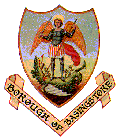 |
This page contains the origins of some of the street names in and around the
Basingstoke area. |
| Aldworth Crescent :- |
named after Richard Aldworth, a wealthy citizen who also
founded Richard Aldworth school. |
| Alexandra Road :- |
associated with royalty, as is George Street. |
| Baynard Close :- |
named after George Baynard, a bailiff under the Charter of
James I and mayor under Charles I. |
| Beaconsfield Road :- |
named after the Victorian statesman. |
| Bedford Place :- |
named after Bedford House which was lived in
by the Duke of Bedford. |
| Bolton Crescent :- |
named after the Bolton family, estate owners at Old Basing,
who lived in Hackwood House. |
| Bounty Road :- |
named after May's Bounty cricket ground, a gift from Col.
John May. |
| Brook Street :- |
named after the river Lodden that once flowed over it. |
| Bunnian Place :- |
takes it's name from Bunny's Bars, an old gate in the area. |
| Burgess Road :- |
named after Mayor John Burgess Soper. |
| Chapel Street :- |
the approach road to the Holy Ghost Chapel. |
| Cranbourne Lane :- |
means Heron Brook. |
| Essex Road :- |
the road builder, Mr. Tyrrell grew up in Essex and named
this after the area, also applies to Raleigh Road and Rochford
road. |
| Flaxfield Road :- |
a very old name, first mentioned in 1300. |
| Harrow Way :- |
the earliest name, dating from Saxon times. |
| Goat Lane :- |
named after the Goat Inn. |
| Merton Road :- |
named after Walter de Merton. |
| Norn hill :- |
derived from Northern Hill, where the shepherds kept their
sheep. |
| Pemerton Road :- |
name of a seventeenth century seller of clothes. |
| Sandys Road :- |
a famous local family who lived at the Vyne. |
| Warton Road :- |
named after the Vicar of Basingstoke from 1723-1745 |
| Wote Street :- |
derives from the Corn Exchange, now the site of the
Haymarket Theater, originally known as Oat Street. |